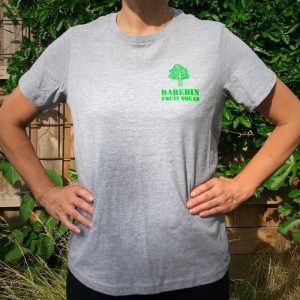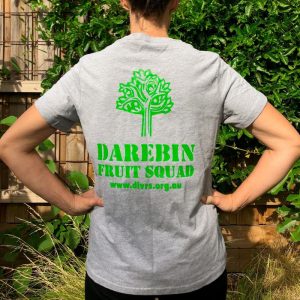Thanks to the people who have contributed to this week’s newsletter: Emily Connors, Genevieve Rigot, Holly Gallagher, Jelena Kasabasic, Sarah Young and Virginia Solomon.
Joe’s Market Garden
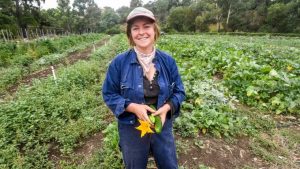 Joe’s Market Garden now have a page in our Local Food Directory.
Joe’s Market Garden now have a page in our Local Food Directory.
Joe’s Market Garden is a 2½ acre Certified Organic farm located next to the Merri Creek in Coburg. They grow mostly leafy greens, herbs and fruiting vegetables. Their farmgate at 34 Edna Grove, Coburg is open Thursdays to Sundays, 8.30am-1pm where, as well as their veggies, you can also buy coffee, toasties and fresh-baked pastries. Their produce can also be found in the CERES Fair Food veggie boxes.
It is Melbourne’s last surviving inner city market garden, having been farmed continuously by Chinese and Italian gardeners for over 150 years. CERES began farming here in 2003 under the guidance of Joe Garita.
Irrigation water is taken from the mains supply and a 100,000 litre underground water tank which collects rainwater from neighbouring townhouses.
Read their Local Food Directory page.
Welcome Emily and colleagues!
More on dyeing eggs naturally
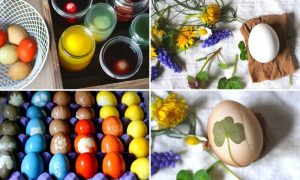 With Easter imminent, this is a topical subject.
With Easter imminent, this is a topical subject.
Jelena Kasabasic has written in with a suggestion: pick some herb leaves with interesting shapes, place them on an egg, tightly wrap a stocking over them and then put them into whatever colour you want.
Several of you have also recommended this article on natural dyed Easter eggs. It provides both a step-by-step guide plus the following list of colorations:
- Red cabbage: blue.
- Red onion: red-brown.
- Yellow onion: orange-caramel.
- Beetroot:: dark pink to red.
- Turmeric: bright yellow.
Some tips for winter vegetable planting
In the April Sustainable Macleod newsletter, Robin Gale-Baker has written an article with 10 tips for winter vegetable planting in Melbourne. Here are her some of her tips related to brassicas (cauliflower, cabbage, kale, etc):
- Plant brassicas so that the lower leaves are partially or wholly submerged in the soil. This prevents wobble which leads to poor anchorage in the soil and small heads.
- Net all brassicas and secure the bottom of the net with weights to prevent the white cabbage butterfly from laying eggs on the foliage. These eggs turn into very hungry caterpillars.
- Lay dripline if possible between rows of brassicas. Brassicas thrive on regular watering. As the plants expand, the leaf coverage makes it difficult for enough rain or even hand watering to get to the soil. Water right throughout winter.
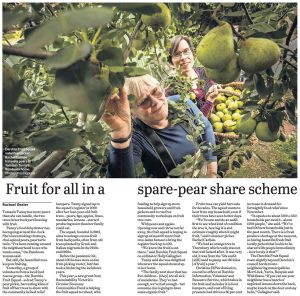 Here is the newsletter of which the tips are a part. The newsletters are monthly and you can sign up to receive them on the Sustainable Macleod website home page.
Here is the newsletter of which the tips are a part. The newsletters are monthly and you can sign up to receive them on the Sustainable Macleod website home page.
Darebin Fruit Squad in the news
On 3rd April, the Darebin Fruit Squad featured in The Age (see graphic right). Thanks for the heads up, Holly Gallagher and Sarah Young!
As you probably know, articles on The Age website are behind a paywall. As you may or may not know, however, they are available for free from many library websites for registered users, including my own (Yarra Plenty Regional Library).
If you would like to support the Darebin Fruit Squad, one way to do it is to buy one of their t-shirts.
Could food be fairer?
Chris Ennis, the founder of CERES Fair Food, has recently written a short article on how his thinking about fair food has evolved over time.
His initial answer to the question Could food be fairer? was to provide an alternative to the way that Coles and Woolworths treat their farmers, supporting small organic and regenerative growers.
It then evolved to include fairer employment of vulnerable people.
It then evolved to include compostable and recyclable packaging.
It is now evolving to include more affordable groceries, and from ‘only organic‘ to ‘organic and‘,
Chris writes around one article a week and you can find them all at this page of the CERES Fair Food website.
Want to buy a book for your children?
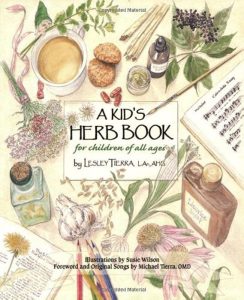 If so, then Genevieve Rigot suggests that you consider A kid’s herb book, which “explores the worlds of herbs with fun activities, projects, songs, stories, healing remedies”.
If so, then Genevieve Rigot suggests that you consider A kid’s herb book, which “explores the worlds of herbs with fun activities, projects, songs, stories, healing remedies”.
A recipe for vanilla figs
This recipe has been provided by North East Region Permaculture (NERP). You can find NERP at Eltham Farmers’ Market on the 2nd Sunday of each month. At next Sunday’s market (9th April), they will have an expert on hand to chat with you about all things poultry, including chickens, ducks, geese and quail.
Ingredients
1¼ kg slightly under-ripe figs
1 kg sugar
½ litre water
½ vanilla pod, split lengthwise
Method
Peel three narrow strips in each fig or prick them all over with a small sharp fork.
Put the sugar, water and vanilla pod into a large pot or preserving pan and bring to the boil. Add the figs, a few at a time, allowing the syrup to come to the boil before adding the next batch.
Cook, uncovered, over the lowest possible heat for 5 hours, or until the figs are soft and translucent. Remove the vanilla pod.
While the figs are still hot, fill warm sterilised jars and top up with the syrup. Seal.
Keep for years if seal is unbroken. Once opened, eat within a month.
Eat with yoghurt or light sour cream as a dessert, or just on their own as a sweet treat.
Which link was clicked most times in the last newsletter?
The most popular link in the last newsletter was the position description for the job at Fawkner Food Bowls.
 Joke (or pun) of the week
Joke (or pun) of the week
Submitted by Olaf Falafel: Someone’s replaced my passport photo with a picture of a marzipan fruitcake – I think my identity has been stollen.
Regular activities over the coming week
Farmers’ and other food markets
- Friday: Community Grocer, Carlton.
- Saturday: Carlton and Coburg.
- Sunday: Alphington, Eltham and Whitehorse.
- Tuesday: Community Grocer, Fitzroy.
- next Wednesday: Really Really Free Market (Coburg).
Food swaps
- Saturday: Brunswick East, Hurstbridge and Mooroolbark.
- Sunday: zip
Community gardens
- Thursday: Diamond Valley Library (Greensborough), Edible Hub (Hurstbridge), SEEDs (Brunswick) and Whittlesea.
- Friday: Chute Street (Diamond Creek), Reynard Street (Coburg) and West Brunswick.
- Saturday: Links (Lalor), Macleod, Northcote Community, Tables (Heathmont) and Thrive (Diamond Creek).
- Sunday: Bellfield, Fawkner Food Bowls, Pentridge (Coburg), Regent (Reservoir) and West Brunswick.
- Monday: SEEDs (Brunswick) and Whittlesea.
- Tuesday: Diamond Valley Library (Greensborough) and Watsonia Library.
- Next Wednesday: Eltham Neighbourhood House, Macleod, Newton Street (Reservoir), Span (Thornbury) and Sylvester Hive (Preston) .
Upcoming face-to-face events – not cooking
Fresh herbs and herbal teas; Thursday, 27th April, 10am-midday; free; Whittlesea.
Delve into the world of herbal teas. Learn how to grow and use fresh herbs in both tea and cooking and the benefits of so doing, especially leading into Winter. At Whittlesea Community Garden.
Autumn seasonal gardening with Kaye Roberts-Palmer; Thursday, 27th April, 11am-midday; free; Doncaster.
Prepare your plants for the winter months and find out how to have the best soil for a productive winter vegetable patch.
Introduction to permaculture (2 sessions); Saturdays, 29th April and 6th May, 10am-3pm; $120 ($12 per hour); Coburg.
Learn permaculture fundamentals in this hands-on course, combining concepts and practices of sustainability, gardening, horticulture, ecology, community development and design thinking. Organised by Reynard Street Neighbourhood House
An afternoon with Matthew Evans, the Gourmet Farmer; Sunday, 30th April, 2-5pm; free; Box Hill.
Speakers: Matthew Evans and Adam Grubb. Matthew lives and works on the Fat Pig Farm in Tasmania. He has featured on the Gourmet Farmer series on SBS and has written 13 books. He will talk about the ways that food and farming can frame the future, including food security, soil health and the sequestration of carbon through regenerative methods. Adam is from Very Edible Gardens. He will talk veggies: where did they come from, what do they need, and the things you can do to get started growing veggies successfully at home.
Beeswax wrap workshop; Monday, 8th May, 6-8pm; $55 ($28 per hour); Brunswick.
Emma will show you how to make beeswax wraps. All materials provided, though you can BYO fabric to be waxed and transformed into wraps. Organised by Brunswick Neighbourhood House.
Advanced composting workshop; Wednesday, 10th May, 7-8.30pm; free; Doncaster.
They will show you how to advance your composting journey, including: speeding up your compost; troubleshooting issues; and how harvest and use your compost.
Wild mushroom foraging and fermentation for beginners; Saturday, 20th May, 10am-1pm; $180 ($60 per hour); Mount Evelyn.
Learn how to identify wild mushrooms and gather them safely. Take a guided walk to search for mushrooms in their natural habitat. The Fermented Mumma will show you how to use field guides, spore prints, and other tools to identify mushrooms by their colour, shape, texture, and scent. You will also learn about the different parts of a mushroom, including the cap, stem, gills, and pores, and how to distinguish between edible and poisonous species. After the foraging expedition, you will have the opportunity to taste and smell a variety of mushrooms, including some that are safe to eat and others that are not. To finish off, the Fermented Mumma will cook up a feast of fermented mushrooms. Organised by The Food School Yarra Valley.
Mushroom foraging; Thursday, 25th May, 6.30-8.30pm; $85 ($43 per hour); Collingwood.
You will learn what spores are exactly and what their prints mean before moving on to tools and techniques for efficient and environmentally-conscious mushroom hunting and correct foraging etiquette. Then you will learn how to identify wild mushrooms, the common species that you’re likely to come across, which edible mushrooms you can use in cooking, and medicinal species, as well as hallucinogenic species and the downright dangerous. Finally, you will learn about ways to cook mushrooms, preservation techniques and tincture preparation, before ending with a tasting of some wild mushrooms.
The fungus amongst us; Sunday, 28th May, 10am-12.30pm; $60 ($24 per hour); Alphington.
Explore the Darebin park lands through a fungal lens. Participants will be guided to see and get close to the local world of fungi. The park adventure will be led by local ecologist Dr Sapphire McMullan-Fisher. Founder of Sporadical City Mushrooms, Julia Laidlaw, will then share the world of zero waste mushroom farming at her farm on the edge of the park land.
In April
- Autumn in the garden with Teresa Day; Wednesday, 5th April, 6.30-8.30pm; free; Doncaster.
- Beekeeping practical hands on – intermediate class; Saturday, 8th April, 10am-4pm; $252 ($42 per hour); Edendale.
- Formidable Vegetable + Mal Webb & Kylie Morrigan; Sunday, 9th April, 5.30-9pm; $27; Diamond Creek.
- Heritage apple tasting; Monday, 10th April, 2-4pm; $15; Templestowe.
- Seila Hierk on Asian winter vegetables; Wednesday, 12th April, 8-10pm; free; Doncaster East.
- Yarra Seed Library Group; Thursday, 13th April, 10am-midday; free; Carlton North.
- Organic vegetable gardening; Saturday, 15th April, 10am-3pm; $120 ($24 per hour); CERES.
- Farming for our future (ages 5 to 8); Tuesday, 18th April, 10am-midday; free; Brunswick East.
- Sustainable gardening (8 sessions); starting Tuesday, 18th April, 10am-2pm; $625 ($16 per hour); CERES.
- Farm to fork (ages 3 to 5); Wednesday, 19th April, 1-3pm; free; Brunswick East.
- Mushroom growing 101; Wednesday, 19th April, 6.30-9.30pm; $160 ($53 per hour); Collingwood.
- Kids in the garden – micro greens and sprouts; Thursday, 20th April, midday-2pm; $15 ($8 per hour); Forest Hill.
- Turning food waste into energy; Thursday, 20th April, 4-6pm; free; Coburg.
- Autumn plant sale; Saturday, 22nd April, 10am-4pm; free; Eltham.
- Yarra Valley Autumn Plant Fair & Garden Expo; Saturday, 22nd April, 10am-5pm; $14; Wandin.
- Beeswax wraps; Saturday, 22nd April, 10.30-11.30am; $10; Forest Hill.
- Diet for good mental health; Saturday, 22nd April, 11am-12.30pm; free; Greensborough.
- Yarra Valley Autumn Plant Fair & Garden Expo; Sunday, 23rd April, 10am-5pm; $14; Wandin.
- Urban food gardening (9 sessions); Wednesdays, starting 26th April, 10am-2pm; $80 for all 9 sessions (Government subsidised fee); Eltham.
- Fresh herbs and herbal teas; Thursday, 27th April, 10am-midday; free; Whittlesea.
- Autumn seasonal gardening with Kaye Roberts-Palmer; Thursday, 27th April, 11am-midday; free; Doncaster.
- Seed saving; Saturday, 29th April, 10-11.30am; free; South Morang.
- Introduction to permaculture (2 sessions); Saturdays, 29th April and 6th May, 10am-3pm; $120 ($12 per hour); Coburg.
- Edible weeds walk; Saturday, 29th April, 10.30am-12.30pm; $30 ($15 per hour); Brunswick East.
- Edible weeds walk; Saturday, 29th April, 1.30-3.30pm; $30 ($15 per hour); Brunswick East.
- Home composting for beginners; Saturday, 29th April, 2-3.30pm; free; Edendale.
- Compost and worm farm workshop; Sunday, 30th April, 11am-1pm; free; Brunswick.
- Seed propagation workshop; Sunday, 30th April, 2-3.30pm; free; Reservoir.
- An afternoon with Matthew Evans, the Gourmet Farmer; Sunday, 30th April, 2-5pm; free; Box Hill.
In May
- Introduction to composting, worm farms and Bokashi bins; Monday, 1st May, 1-2.30pm; free; Ringwood.
- Seed saving with Maria Ciavarella; Wednesday, 3rd May, 6.30-8.30pm; free; Doncaster.
- Turning food waste into energy; Saturday, 6th May, 10am-midday; free; Coburg.
- Composting and worm farming workshop; Saturday, 6th May, 2-4pm; free; Camberwell.
- Youth world food garden – why waste it?; Saturday, 6th May, 2-5pm; free; Preston.
- Kalorama Chestnut Festival; Sunday, 7th May, 10am-4pm; free; Kalorama.
- Composting, worm farming and bokashi bins workshop; Monday, 8th May, 10-11.30am; free; Bayswater North.
- Beeswax wrap workshop; Monday, 8th May, 6-8pm; $55 ($28 per hour); Brunswick.
- Advanced composting workshop; Wednesday, 10th May, 7-8.30pm; free; Doncaster.
- Complete urban farmer (14 sessions); weekly sessions starting Friday, 12th May, 9am-3pm; $895 ($11 per hour); CERES.
- Heathcote in the city; Saturday, 13th May, 10am-4pm; $230 ($38 per hour); Abbotsford.
- Edible weeds walk; Saturday, 13th May, 10.30am-12.30pm; $30 ($15 per hour); Brunswick East.
- Edible weeds walk; Saturday, 13th May, 1.30-3.30pm; $30 ($15 per hour); Brunswick East.
- Wild mushroom foraging and fermentation for beginners; Saturday, 20th May, 10am-1pm; $180 ($60 per hour); Mount Evelyn.
- Spoon carving workshop with an axe and knife; Saturday, 20th May, 10am-4pm; $230 ($38 per hour); Coburg North.
- Olives to oil; Sunday, 21st May, midday-3pm; $15; Preston.
- Olives to oil harvest festival; Sunday, 21st May, midday-4pm; $15; Brunswick East.
- Smart storage to reduce food waste workshop; Tuesday, 23rd May, 10-11.30am; free; Ringwood.
Regular events
- Beekeeping workshop; roughly once a month on Saturdays, 1-3.30pm; $85 ($34 per hour); Brunswick East.
- Carlton aperitvio food tour; every Fridays, 5-7pm; $139 ($70 per hour); Carlton.
- Eltham trials (walking food tour); various Saturday mornings and Thursday evenings; $65 ($22 per hour); Eltham.
- Flavours of Coburg food tour; 3rd Saturday of each month, 10am-1pm; $65 ($22 per hour); Coburg.
- Gin making masterclass; most Saturdays, 10am-1pm; $175 ($58 per hour); Nunawading.
- Ratio Cocoa Roasters behind the scenes chocolate factory tour; various Fridays and Saturdays; $20 ($14 per hour); Brunswick.
- Spoon carving workshop; various Saturdays and Sundays, 10am-1pm; $130 ($43 per hour); Coburg North.
- Truffle workshop at Ratio Cocoa Roasters; 3rd Sunday of each month, 11am-1pm; $75 ($38 per hour); Brunswick.
- Wine tasting masterclass; Saturdays, 3-5pm; various prices; Northcote.
Upcoming face-to-face events – cooking
Childrens Easter chocolate making workshop; Saturday, 8th April, 10am-midday; $10; Ringwood.
For children aged 7-14. Shabina will show the children how to make rocky road. They will then participate in an Easter egg hunt, where they will search for hidden eggs filled with chocolate treats. The children will get to take home their own handmade rocky road creations. Organised by the Central Ringwood Community Centre.
Easter chocolate workshop; Saturday, 8th April, 1-3pm; $50 ($25 per hour); Fitzroy.
Create unique and personalised Easter cards using chocolate and edible decorations. You will be provided with a blank card made of high-quality Belgian chocolate, and various tools and materials are available to decorate the card, such as edible colours, sprinkles, and chocolate figures. An instructor will be present to provide guidance.
Kombucha / Jun M.O.B.; Thursday, 20th April, 6.30-8pm; $85 ($57 per hour); Fitzroy North.
They will demonstrate how to feed your mother/SCOBY (choose between kombucha or jun). You will then flavour their own batch ready for second phase fermentation using fruits, herbs and spices. Take home your selected SCOBY and your personally flavoured bottle of kombucha/jun. M.O.B. stands for ‘mingling over bacteria’.
Hospitality (8 sessions); Tuesdays, starting 2nd May, 9.30am-midday; $50 ($3 per hour); Lower Templestowe.
This is a cooking course that will develop your basic skills and confidence around the preparation of food. This course will run in a supportive group session and has possible pathways to further study. Organised by Living And Learning @ Ajani.
Cooking for one (5 sessions); Thursdays, starting 4th May, 11am-1pm; $50 ($5 per hour); Lilydale.
Learn how to cook easily just for one person. Make the meals each week, and eat together what you have made. Organised by Lilydale Community House.
Sourdough breadmaking; Saturday, 6th May, 10am-12.30pm; $64 ($26 per hour); Lower Templestowe.
Learn all the steps to make your own sourdough at home with this simple recipe. You will take home a sourdough starter and some dough to bake. Take a 2 litre container with a lid and an apron. Organised by Living And Learning @ Ajani.
Honey ferments M.O.B.; Wednesday, 10th May, 6.30-8pm; $110 ($73 per hour); Fitzroy North.
Learn how to make 3 different ferments all with a focus on honey: wild mead; jun (similar to kombucha); and honey fermented garlic. Go home with 3 jars of ferments. M.O.B. stands for ‘mingling over bacteria’.
French patisserie – Mother’s Day cake; Saturday, 13th May, 1.30-4.30pm; $125 ($32 per hour); Lower Templestowe.
Learn how to make and bake a red velvet cake with cream cheese frosting which you will then apply to your cake. To finish off, create your own decoration to make that cake extra special. Organised by Living And Learning @ Ajani.
French patisserie – macarons; Wednesday, 17th May, 6.30-8.30pm; $85 ($43 per hour); Lower Templestowe.
Tish will pass on her techniques for making macarons. Take an apron and a container. A limit of 4 participants in total. Organised by Living And Learning @ Ajani.
How to make fresh ravioli; Thursday, 18th May, 6-8.30pm; $49 ($20 per hour); Lower Templestowe.
Make fresh spinach and ricotta ravioli and a sauce. Enjoy tasting the dishes then take some fresh ravioli home to cook for the family. Take a container and an apron. Organised by Living And Learning @ Ajani.
Dumpling making workshop; Friday, 26th May, 6-8.30pm; $75 ($30 per hour); Park Orchards.
Make Chinese dumplings from scratch. The dough you prepare can be used for either boiled dumplings (shui jiao) or potstickers (guo tie). Then make vegetarian dumplings. Facilitator: Miki. Organised by Park Orchards Community House.
Sourdough breadmaking (2 sessions); Saturdays, 27th May and 17th June, both 10am-12.30pm; $150 ($30 per hour); Park Orchards.
In the first session, Nadine will take you through the basics of sourdough breadmaking. In the second session, you will make a seeded sourdough loaf. You will also get to sample different loaves, including a fruit loaf and olive and herb loaf. This class is best suited to those who have some experience with bread making, however it is not essential. Organised by Park Orchards Community House.
Filled pasta with Piera; Saturday, 27th May, 10am-1pm; 140 ($47 per hour); Thomastown.
Learn how to make the dough from scratch and how to shape the pasta. You will be making both balanzoni (large green tortellini-like pasta filled with ricotta, mortadella & parmesan cheese) and ravioli di pesce (half-moon shaped pasta filled with mascarpone, crab meat, snapper, thyme & lemon). At the end, enjoy the pasta you have made together with a class of wine. Host: Piera Pagnoni. Organised by That’s Amore Cheese.
Feta, haloumi and mascarpone cheese making; Saturday, 27th May, 10am-4pm; $240 ($40 per hour); CERES.
You will learn: the cheese making process using cultures and rennet; salt – brining and dry-salting cheese; and marinating feta in olive oil. You will take home what you make. Presenter: Kristen Allan.
French patisserie – macarons (advanced); Saturday, 27th May, 1.30-4.30pm; $115 ($38 per hour); Lower Templestowe.
Extend your macaron making skills to make two fillings and different shapes and bi-colour macarons. Take an apron and a container. A limit of 4 participants in total. Organised by Living And Learning @ Ajani.
Gluten-free kitchen skills; Sunday, 28th May, 10am-3pm; $120 ($24 per hour); CERES.
Presenter: Melanie Leeson, from Mettle + Grace. After an introduction to gluten-free flours and their texture, taste and how to use them, you will have the opportunity to cook a collection of recipes, including: a cake using your own gluten-free flour blend; crackers to pair with a seasonal dip; pizzas; and a short-crust pastry dough for quiche. At the end, the class will sit down to eat lunch together.
Farmhouse sake / doburoku night; Wednesday, 31st May, 6.30-8.30pm; $125 ($63 per hour); Fitzroy North.
Make your own sake using rice, koji and water and time. This is a 3 step process and you’ll take home stage one in a 3 litre jar – with koji for step 2 – and a couple of bottles for the final bottling step. They will also cover amazake – the sweet, more immediate (overnight) drink.
In April
- Childrens Easter chocolate making workshop; Saturday, 8th April, 10am-midday; $10; Ringwood.
- Easter chocolate workshop; Saturday, 8th April, 1-3pm; $50 ($25 per hour); Fitzroy.
- Kids school holiday cooking program; Thursday, 13th April, 10am-midday; $40 ($20 per hour); Hawthorn.
- Cook Indian by the creek; Friday, 14th April, 5-6.30pm; $65 ($44 per hour); Diamond Creek.
- Gnocchi making class; Sunday, 16th April, 10am-1pm; $140 ($47 per hour); Thomastown.
- Indonesian food experience; Tuesday, 18th April, 10.30am-1pm; $40 ($16 per hour); Yarra Glen.
- Milk kefir magic; Tuesday, 18th April, 6.30-8.30pm; $125 ($63 per hour); Fitzroy North.
- Cup cake decorating (for children); Wednesday, 19th April, 1-2pm; $15; Brunswick.
- Sushi sushi (for children); Thursday, 20th April, 11am-midday; $12; Lilydale.
- Kombucha / Jun M.O.B.; Thursday, 20th April, 6.30-8pm; $85 ($57 per hour); Fitzroy North.
- Beginners cheese making class; Saturday, 22nd April, 10am-3pm; $250 ($50 per hour); Thomastown.
- Pasta making – gnocchi and fettucine; Sunday, 23rd April, 10am-1pm; $165 ($55 per hour); Mount Evelyn.
- Introduction to fermenting at home; Sunday, 23rd April, 10am-1pm; $80 ($27 per hour); CERES.
- Kraut M.O.B.; Wednesday, 26th April, 6.30-8pm; $85 ($57 per hour); Fitzroy North.
- Pasta making workshop; Saturday, 29th April, 1-3pm; $55 ($28 per hour); Park Orchards.
- Food waste workshop with Open Table; Saturday, 29th April, 2-4pm; free; Carlton.
- Elderberry syrup and fire cider with Miranda; Sunday, 30th April, 1.30-3.30pm; $125 ($63 per hour); Mount Evelyn.
In May
- Hospitality (8 sessions); Tuesdays, starting 2nd May, 9.30am-midday; $50 ($3 per hour); Lower Templestowe.
- Preserving the harvest – then and now; Tuesday, 2nd May, 2-3pm; free; Mooroolbark.
- Catering 4 success (8 sessions); Tuesdays, 2nd May to 20th June, each 10am-2pm; $48 ($2 per hour); Bayswater North.
- Cooking for one (5 sessions); Thursdays, starting 4th May, 11am-1pm; $50 ($5 per hour); Lilydale.
- Sourdough basics; Thursday, 4th May, 6.30-8.30pm; $120 ($60 per hour); Collingwood.
- Sourdough breadmaking; Saturday, 6th May, 10am-12.30pm; $64 ($26 per hour); Lower Templestowe.
- Growing and cooking with bushfoods; Saturday, 6th May, 10am-3pm; $120 ($24 per hour); CERES.
- Water kefir M.O.B.; Tuesday, 9th May, 6.30-8pm; $85 ($57 per hour); Fitzroy North.
- Honey ferments M.O.B.; Wednesday, 10th May, 6.30-8pm; $110 ($73 per hour); Fitzroy North.
- Preserving and fermenting workshop with Insun Chan; Thursday, 11th May, 2-3.30pm; free; Lilydale.
- Indian cooking workshop series (3 sessions); starting Thursday, 11th May, 2-4pm; $210 ($35 per hour); Alphington.
- Traditional arancini and cantucci biscuits workshop; Saturday, 13th May, 10am-1pm; $180 ($60 per hour); Mount Evelyn.
- French patisserie – Mother’s Day cake; Saturday, 13th May, 1.30-4.30pm; $125 ($32 per hour); Lower Templestowe.
- Sourdough for beginners; Saturday, 13th May, 2-5pm; $60 ($20 per hour); Brunswick.
- French patisserie – macarons; Wednesday, 17th May, 6.30-8.30pm; $85 ($43 per hour); Lower Templestowe.
- How to make fresh ravioli; Thursday, 18th May, 6-8.30pm; $49 ($20 per hour); Lower Templestowe.
- Miso M.O.B.; Thursday, 18th May, 6.30-8.30pm; $145 ($73 per hour); Fitzroy North.
- Sourdough bread baking; Saturday, 20th May, 9am-5pm; $190 ($24 per hour); CERES.
- FFS … ferment four staples; Saturday, 20th May, 1-5.30pm; $365 ($81 per hour); Fitzroy North.
- Italian sweets workshop; Sunday, 21st May, 10am-1pm; $180 ($60 per hour); Mount Evelyn.
- Preserving the season’s harvest; Sunday, 21st May, 10am-3pm; $120 ($24 per hour); CERES.
Regular classes
- Artisan bread making; various Sundays, 8am-2pm; $230 ($38 per hour); Abbotsford.
- BBQ classes; various days and times; $135-150 ($45-50 per hour); Brunswick East.
- Beginners bread making; various Sundays, 8am-2pm; $230 ($38 per hour); Abbotsford.
- Chocolate making and pastry classes for children; various days and times; various costs; Yarra Glen.
- Chocolate making workshop; various Thursdays, Fridays and Saturdays; $152 ($38 per hour); Blackburn.
- Chocolate making workshop; various Saturdays and Sundays; $125 ($63 per hour); Box Hill North.
- Kombucha brewing workshop; last Thursday of each month, 7-11pm; $49 ($12 per hour); Brunswick.
- La Cucina di Sandra (Italian); various evenings, 6.30-10.30pm; $120 ($30 per hour); Richmond.
- Nonna & Mum’s cooking class; 4th Thursday of each month, 7-10pm; $24 ($8 per hour); Thornbury.
- Otao Kitchen (many different classes); various dates, times and prices but mostly 3 hours long and $197; Abbotsford.
- Rosa’s cooking classes (Italian); various Saturdays and Sundays, 10.15am-3pm; mostly $165 ($35 per hour); Bundoora.
- Sourdough bread workshop; roughly once a month on Saturdays, 9-11.30am; $185 ($74 per hour); Brunswick East.
- Tea blending; various Sundays; $75 ($60 per hour); Brunswick.
- The ultimate biscuit class; various Tuesdays, 10am-3pm; $162 ($32 per hour); Blackburn.

